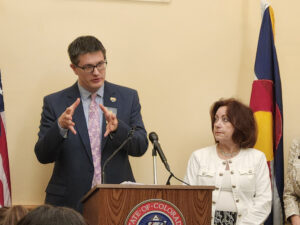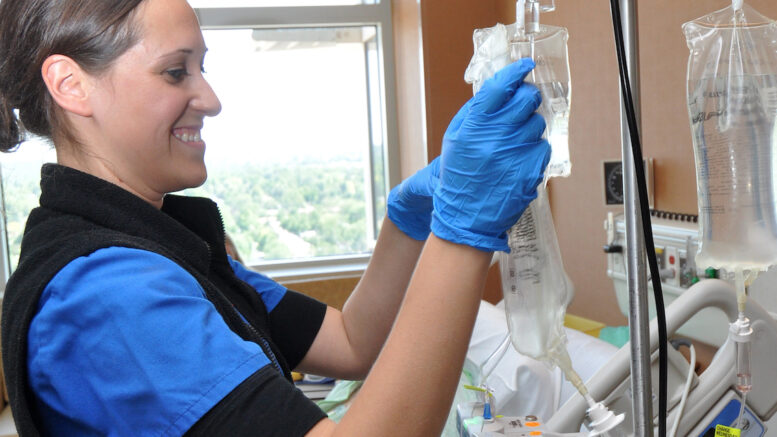With a controversial bill to cap insurance payments to hospitals idling in the House without a reliable path to Gov. Jared Polis’ desk, hospitals are pushing forward an alternate solution to boost funding to safety-net care providers — an idea getting huge bipartisan support.
To be sure, some backers of Senate Bill 290, which could generate as much as $200 million over three years for clinics and behavioral-health centers that disproportionately treat uninsured Coloradans, say it is not a mutually exclusive proposition from House Bill 1174. But hospital leaders say that SB 290 is not just a proposition that will do away with the need to put reimbursement caps on their facilities but also a better alternative, fueled in part by their own fundraising, that will get more money more quickly to safety-net centers.
HB 1174, which was rolled out by sponsors and Lt. Gov. Dianne Primavera on Feb. 10 and cleared its first committee 16 days later, would limit what small-group health insurers and the insurance plan covering state workers could pay hospitals — the first such reimbursement cap proposed in this state. In addition to setting reimbursement rates from those plans at 165% of Medicare reimbursement levels, the bill would take 80% of the $65 million in annual savings the state would generate through caps and disperse it, starting in July 2027, to struggling safety-net providers.
Hospitals point instead to new bill
But after advancing from the House Appropriations Committee to the floor on March 11, HB 1174 has remained unmoving on the second-reading calendar, and some of its backers have conceded there is no path to passage in the more moderate Senate. Samantha Albritton, a health-insurance broker connected to the group Small Business Majority, recently said in an interview that the pending death of HB 1174 must force legislators to think of other ways to limit small employers’ healthcare costs at a time when many are dropping health-insurance coverage for workers due to costs.
SB 290 does not cap reimbursements to any healthcare provider, but it does do what HB 1174 intended financially, as it directs money to a new state fund that would be distributed to safety-net providers based on the portion of statewide uninsured individuals they treat. The Colorado Hospital Association will raise $40 million for the fund, and another $60 million will come from interest earnings on the Treasurer’s unclaimed property fund — a total that, when matched 1:1 with federal funds, could generate $200 million in three years.
The payouts under SB 290, which is sponsored by Democratic Sen. Kyle Mullica of Thornton and Republican Sen. Barbara Kirkmeyer of Brighton, also would start in the fiscal year that begins July 1, nearly two years earlier than planned under HB 1174.

Colorado state Sens. Kyle Mullica and Barbara Kirkmeyer explain their bill on safety-net funding to the Senate on Friday.
Hospitals have been hit hard by the increasing number of patients who rolled off Medicaid after the pandemic and have been seeking care without being able to pay. Emergency room visits by uninsured patients were up 50% last year versus 2019, and charity care is up 140% in that same period, CHA Chief Strategy Officer Katerine Mulready told the Senate Finance Committee on April 22.
A focus on safety-net providers
But safety-net providers like Clinica Family Health & Wellness, whose clientele is now 40% uninsured, have gotten walloped far worse, CEO Simon Smith told the same committee before it passed SB 290 unanimously. The organization serving low-income patients seeking physical- and behavioral-health treatment in several Front Range counties closed clinics and laid off 15% of staff last year, putting its future in question without immediate relief, Smith said.
“I think this is the best solution that’s in front of the Legislature,” he testified about SB 290. “We know the challenges we have been facing. We know that for every patient we can get a medical home, we can help them … I do think longer-term solutions are necessary.”
HB 1174 has been pitched as that longer-term solution for the safety-net clinics, for the state budget and for small employers that cosponsoring Rep. Kyle Brown, D-Louisville, said are left paying higher insurance premiums because they lack bargaining power. But CHA said capping reimbursements on 260,000 patients could cost facilities $200 million — a number disputed by bill proponents — and force them both to increase costs to individuals in the self-insured and large-group market and to cut unprofitable services.

Colorado state Rep. Kyle Brown, supported by Lt. Gov. Dianne Primavera, describes a bill to cap some hospital reimbursements at a news conference in February.
Many battles for hospitals this session
“It will kill patients,” Benson Pulikkottil, medical director for HCA HealthONE Swedish Burn and Reconstructive Center in Englewood, testified on Feb. 26 — a statement that’s been repeated by the bill’s opponents ever since.
Hospitals have been involved in several legislative battles this year, always making the case that the combination of the increased load of uninsured patients and the skyrocketing costs of labor and supplies over the past five years has left them in precarious straits. Roughly 70% of state facilities have unsustainable operating margins under 4%, according to the CHA, leaving urban hospitals susceptible to service cuts and rural hospitals susceptible to closure if new laws boost costs or reduce reimbursements.
In addition to fighting against HB 1174, hospitals have pushed another bill, SB 71, that would bar pharmaceutical manufacturers from placing any limits on the pharmacies that can distribute discounted drugs that hospitals purchase through the federal 340B program. Such limits lower the discounts that hospitals can receive, even as more hospitals rely on those discounts to keep afloat unprofitable services like behavioral healthcare.
“Strong bipartisan support”
And hospitals fought SB 198, which would have boosted the Colorado Attorney General’s ability to investigate mergers and acquisitions of health-care entities and block them if they lead to increases in prices or negatively impact wages or collective bargaining agreements. Cosponsoring Sen. Cathy Kipp, D-Fort Collins, said as she asked a committee to kill SB 198 on April 17 that she will gather stakeholders weekly beginning on June 2 to come up with a consensus 2026 bill that will stop industry consolidation from lowering healthcare access.
With the fate of other hospital-impacting bills unclear — a scheduled hearing on SB 71 was delayed on Monday, just 10 days from the end of the legislative session — it appears that SB 290 has the momentum to become law. It passed the Senate 33-1 on Monday and now heads to the House with the promise that, at a time of division over how to fix healthcare woes, it can offer a united way to help the most in-need patients.
“Senate Bill 290 is a great example of how we can and should be working together for the benefit of Coloradans — a pragmatic and meaningful solution that garnered strong bipartisan support from policymakers representing communities across the state,” Kirkmeyer said in a news release.
